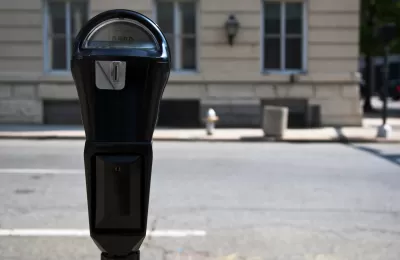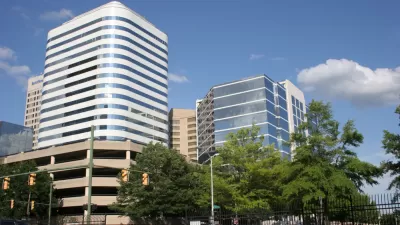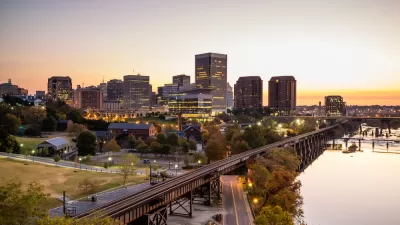The Virginia city is replete with underused off-street parking lots, which city councilors hope to make available for parking at more times while encouraging transit use.

Richmond, Virginia joined the growing list of cities to repeal parking minimums as one strategy for making housing more affordable and less costly to build, reports Elizabeth McGowan in Next City.
The move was, surprisingly, approved unanimously by the city’s Planning Commission and city council. City Councilor Andreas Addison, who has been a staunch supporter of repealing parking requirements, points out that there is plenty of parking space in the city, it’s just often designated for one single use, making it obsolete the rest of the time. “When that data was presented, I realized we don’t have a parking problem,” said Addison, “We have a lack-of-access-to-parking problem.”
Addison “envisions the new measure will ‘reinvent paved space’ by introducing the concept of shared parking in off-street lots. Before, those spaces could only be used for the particular purpose laid out in the zoning code.”
Meanwhile, the Greater Richmond Transit Company (GRTC) is still offering free rides on its buses and opened a high-capacity bus rapid transit line five years ago. “Addison is hopeful Richmond’s decision to scale back on parking lots can be a model for other Virginia cities intent on reshaping how people move around.”
FULL STORY: Richmond Scraps Parking Space Rules In An Effort To Curb Transportation Emissions

Trump Administration Could Effectively End Housing Voucher Program
Federal officials are eyeing major cuts to the Section 8 program that helps millions of low-income households pay rent.

Planetizen Federal Action Tracker
A weekly monitor of how Trump’s orders and actions are impacting planners and planning in America.

Ken Jennings Launches Transit Web Series
The Jeopardy champ wants you to ride public transit.

California Invests Additional $5M in Electric School Buses
The state wants to electrify all of its school bus fleets by 2035.

Austin Launches $2M Homelessness Prevention Fund
A new grant program from the city’s Homeless Strategy Office will fund rental assistance and supportive services.

Alabama School Forestry Initiative Brings Trees to Schoolyards
Trees can improve physical and mental health for students and commnity members.
Urban Design for Planners 1: Software Tools
This six-course series explores essential urban design concepts using open source software and equips planners with the tools they need to participate fully in the urban design process.
Planning for Universal Design
Learn the tools for implementing Universal Design in planning regulations.
Ada County Highway District
Clanton & Associates, Inc.
Jessamine County Fiscal Court
Institute for Housing and Urban Development Studies (IHS)
City of Grandview
Harvard GSD Executive Education
Toledo-Lucas County Plan Commissions
Salt Lake City
NYU Wagner Graduate School of Public Service





























